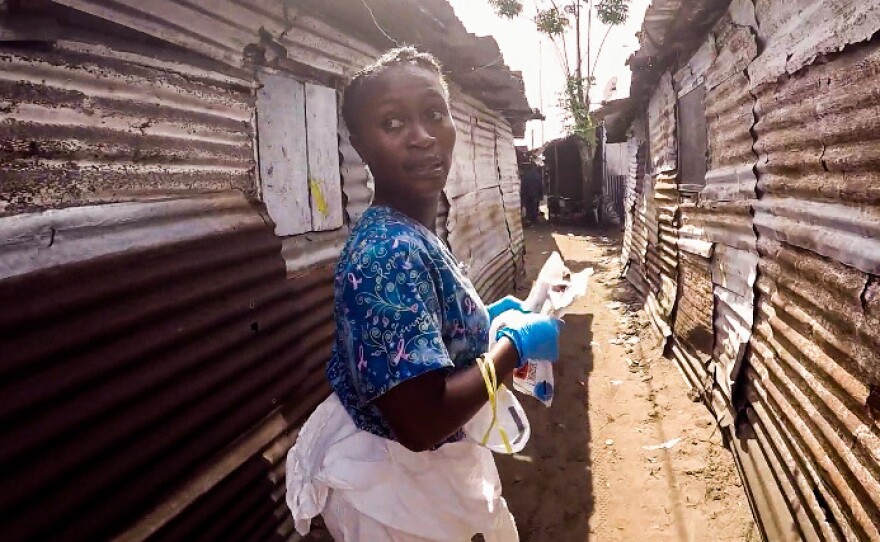Tonight, Garmai Sumo will be holding an Oscar-watching party in her home in Monrovia, Liberia. The 29-year-old nurse is featured in Body Team 12, which is up for Best Short Documentary (and considered a likely winner by some critics).
The 13-minute film, by David Darg and Bryn Mooser, follows the team members as they collect the bodies of Ebola victims at the height of the outbreak, carrying the shrouded victims through narrow alleyways while family members wail in sorrow.
In this intense documentary, everyone is transformed. The body collectors look as if they've stepped out of a sci-fi movie in their protective garb, but they also become unsung heroes because of the dangerous and critical job they take on. The faces of the survivors are distorted by grief, stained by tears. Amid the chaos of Ebola, Sumo is a voice of hope and faith. "The smoke [from the cremation of victims] rises up to the heavens along with the souls of the dead," she says in the film, sounding as matter-of-fact as if she were discussing the weather.
We spoke with Darg and Mooser about the documentary and the riveting Sumo — who, they say, "screamed with joy on the phone" at the news of the nomination. The interview has been edited for clarity and length.
Did you get to pick which team you filmed?
Darg: I was randomly assigned to Team 12. The Liberian Red Cross was coordinating the body teams. They just said, "Go out with those guys."
So it was a stroke of luck that you came to meet Sumo?
Darg: I didn't know what to expect. I was blown away by all of their bravery but particularly by Garmai Sumo, the only female member.
Were there women on other teams as well?
Darg: It was the policy of the Red Cross to have a female member on all teams. They found that the female members made the best negotiators when it came to negotiating the release of [deceased] family members.
That's something Sumo discusses in the film: "The [family members] don't know where you're taking the body, they don't know what you're going to do with the body, they just don't know. We don't blame them. The only thing we do is to counsel them, talk to them." Her courage makes me wonder: How would I respond in a similar situation?
Mooser: Friends back home would say, 'I don't know what I'd do" [in a crisis]. But when you see the worst conditions, you see the best parts of humanity. Time and time again, as a journalist in [places of disaster] I see people stepping up, being resilient, coming together as a community to help each other.
The patriotism of the body collectors is also impressive.
Darg: Having gone through a brutal civil war not that long ago, Liberia is really a shell of a nation. To see the level of deep love by the team members for their nation and their countrymen, willing to risk themselves to stand on the front lines, was moving and beautiful — and surprising.
I can only imagine how much footage must have been cut to get the film down to 13 minutes.
Mooser: There was a scene we had of a coffin maker in Monrovia, on the side of the road making coffins. We thought business was probably booming. But he was so mad — he wasn't getting any business because people were getting cremated. But in the end he took away from Garmai's story.
Was everyone on the team okay — did anyone catch the Ebola?
Darg: Miraculously, none of them contracted Ebola.
And what is Sumo doing now?
Darg: She's running a program for children who lost both parents to the disease. She was there with many of these children in her capacity as a body team worker, carrying their parents away. For her to be able to go back and be with those children, to provide joy and hope, is not only great for the kids but also a catharsis for her [as she] deals with the emotional aftermath of what she went through.
Copyright 2016 NPR. To see more, visit http://www.npr.org/.






